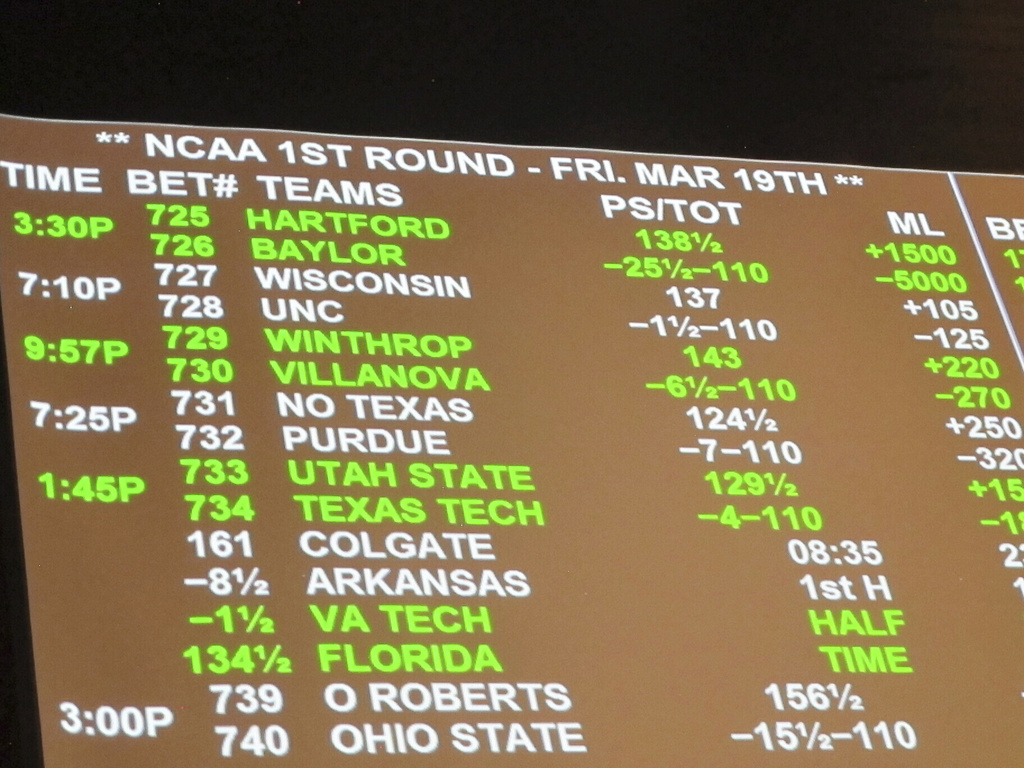Table of Contents

Betting on the spread is the most popular form of sports betting, for multiple reasons. Bettors will wager on teams or players to win or not lose by a certain amount of points. When bettors bet on the spread, they are betting on a favorite to win and cover. When bettors bet against the spread, they are betting on the underdog to cover.
This article will break down how to bet against the spread, along with other practices and best tips for this specific market. It’s crucial for anyone interested in sports betting to understand the spread market entirely, so let’s get to it. Also check out the various spread contests at RYP, and start your own pool against friends and family!
What is Betting Against the Spread (ATS)?
As mentioned above, betting the spread market means a bettor is not only wagering on a player/team to win but to also cover a certain amount of points given. The spread market is also known as the ATS (Against the Spread).
So if you hear someone say ‘The Yankees are 12-5 ATS,’ that just means the Yankees have covered the spread in 12 of 17 games (failing to cover five games). But what does it mean to cover the spread? Let’s use the example below to explain.
Falcons +2.5 (-110)
Saints -2.5 (-110)
In the above example, the Falcons have been given a +2.5-point spread while the Saints have been given a -2.5-point spread. Teams represented with a plus-number, the Falcons in this case, are established as the underdogs. This means the Falcons must either win the game or only lose the game by two points or less. If either occurs, then the Falcons would ‘cover’ the spread.
Teams represented with a minus-number, the Saints in this case, are established as the favorites. This means the Saints must not only win the game, but they must win the game by three or more points in order to ‘cover’ the spread.
How to Bet Against the Spread
Betting against the spread is no different than betting on any other moneyline. Let’s use the same example as above.
Falcons +2.5 (-110)
Saints -2.5 (-110)
Let’s say a bettor wanted to wager on the Saints to cover the spread. It would cost $110 to potentially profit $100. If the Saints win the game by three points then the bettor would get the $110 wager returned, along with the $100 in prize winnings. If the Falcons win the game or only lose by two points then the bettor would simply lose the $110 wager with no return.
Is betting on the spread always the same price? No. Different sportsbooks will use different moneylines to entice bettors to shop with them. Be sure to find the best price possible. How can you find good value? Let’s pretend that the above Falcons-Saints example is from DraftKings, but on FanDuel the odds look like this.
Falcons +2.5 (-115)
Saints -2.5 (-105)
Notice that the numbers in parentheses are different? Those numbers are also known as moneylines, which are basically price tags. If a bettor who fancies the Saints stumbles across FanDuel, they’ll notice it will cost them less to wager with FanDuel. The DraftKings example would cost a bettor $110, whereas the FanDuel example would cost a bettor $105. It’s only a five dollar difference, but cheaper.
When betting on spread markets, be sure to check various sportsbooks for the best moneyline offering. This can also be true for the spread number itself. Let’s say DraftKings and FanDuel both have the Falcons +2.5 and the Saints -2.5, but you decide to check a third sportsbook – Caesars.
Falcons +2 (-110)
Saints -2 (-110)
Notice that the Saints are -2-point favorites with Caesars. This means that if a bettor takes the Saints spread at -2 with Caesars, the Saints could win by two points and result in a draw (bettor gets money back but doesn’t win a profit). If a bettor takes Saints -2.5 with DraftKings or FanDuel, then the Saints winning by two points isn’t an option.
While football and basketball typically see similar spreads, hockey and baseball don’t. It’s equally as important to understand that spreads vary between sports. They’re also called something entirely different.
In hockey the spread market is referred to as the ‘puck line’ and it is almost always set at 1.5. Baseball is similar in which the spread market is almost always set at 1.5, and known as the ‘run line’. Tennis also presents a different strategy with the spread, as the tennis spread involves the difference of games won between both players.
Best Tips and Strategies to Bet Against the Spread
There are a lot of different strategies to consider when betting against the spread, or betting in general. Most are similar but there are some unique challenges you will face when betting on this popular market. Let’s break down the best tips and practices to consider when betting against the spread.
Stick To Sports You Know
As mentioned above, the spread markets will alter from sport to sport. Don’t enter a puck line market looking to get lucky if you don’t follow hockey. Open net goals will crush puck line bettors if you don’t know what you’re doing.
With varying sports come varying markets, and the spread is no different. Stick to what you know and what you are comfortable betting on. If you don’t understand how the tennis spread works with game totals, then skip it and move on to something you’re familiar with.
Shop For The Best Odds & Spread
This was mentioned before, but always shop for the best odds out there. Not only odds, but also be looking for the best spread possible. Sportsbooks are competing to get you to shop with them, so let them battle. Take advantage of not only the best price, but the best spread for your bet.
Be Aware Of Player Injuries
This can have a significant impact on the spread, especially for sports like football where the games are not daily. If a football player injuries himself during practice on Thursday, the spread might change for Sunday’s game.
Baseball pitchers and hockey goalies are probably the most crucial positions for this tip. If a starting pitcher or goalie is scratched due to an injury then the bettor will want to know. It might not change the puck or run line much, but the asking price will shift.
Check Lineups
Much like player injuries, lineups can change spreads – especially in basketball. The NBA sees more stars sit than ever before, and players will be ruled out just hours before tipoff. There are various websites and apps that track player news and alerts, so bookmark them. It’s crucial to understand each team’s lineup before wagering on a spread.
If you wake up one morning and decide to take the Clippers -3.5 against the Jazz only for Kwahi Leonard to be ruled out, you’re in trouble. Suddenly the Clippers’ spread drops to -1 and you’re stuck with a -3.5 instead. Always check lineups but especially for basketball and baseball.
Alternate Spreads
This is a tricky market, as alternate spreads can work for or against you. As an expert I would recommend sticking to alternate spreads with plus-value. Be careful with these, but if you are not happy with the spreads that books are giving for a particular game, feel free to explore the alternate spreads.
If a bettor thinks the Saints will beat the Falcons by six points or more, then they can take the Saints -5.5 as an alternate spread instead of the -2.5 from the example above. The asking price will alter depending on which direction of the spread the bettor leans towards.
Check Team and Player Betting Stats
Betting stats should never decide picks for you, but they will shift you in the right direction. There are various sites that provide betting stats, such as RYP. The New York Knicks might have a 30-15 record, but they might only be 15-30 ATS. Just because a team or player is winning games doesn’t mean they are covering spreads.
The Detroit Lions had one of the worst records a few years ago, but had the best ATS record in the league. So despite losing a ton of games, the Lions were close to winning a lot of them and resulted in winning many spreads. Never be fooled and check the ATS record of teams and players before wagering on the market.
General FAQs
How to make a sports pool?

Starting a sports pool is easy with RunYourPool! We have fully customizable settings, dedicated customer support, and we make it easy to invite friends so you can compete against them.
What is a sports pool?

Sports pools are games to play with family and friends. With RunYourPool, all you need to do is pick your sport, pick one of our game types, set up your pool, and compete!
How do I invite people to my pool?

Inviting friends to your pool is easy with RYP! We provide you with a custom link that you can send out to anyone you would like. We also have a connections feature to allow you to easily invite members to join your pool.
Who can play in a sports pool?

Anyone can play in a pool on RunYourPool! With our array of game types throughout multiple sports, there's an option for everyone.
How much does RunYourPool cost?

Our pricing tiers are determined by how many members you have in your pool. We have three tiers; Amateur, Pro, and Front Office. Our pricing page provides a breakdown of all three options!
Is RunYourPool legal?

RunYourPool is 100% legal. We do not allow any illegal entry fees or gambling on our website.
